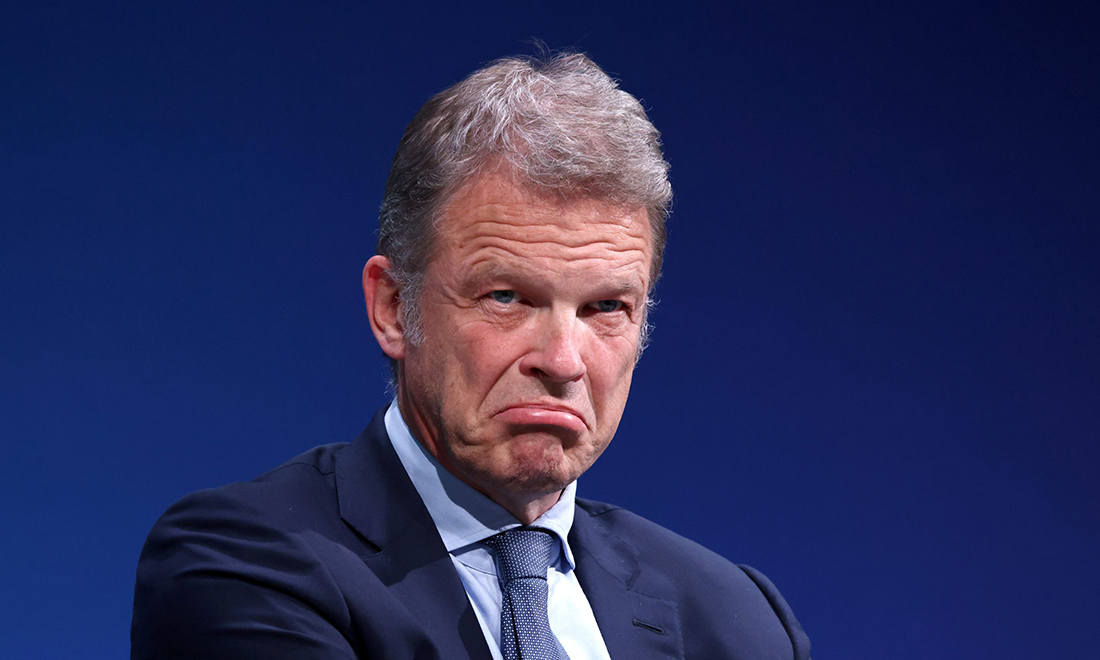
德意志银行首席执行官克里斯蒂安·泽温认为,德国人真正需要做的是更加努力地工作。
据彭博社报道,他上周三在法兰克福的一次会议上谈到德国目前的经济困境时说:“让我们回到和欧盟平均水平一样努力工作的状态吧。”
德国最大的公司大众汽车(Volkswagen)上周占据了各大媒体的头条,此前该公司表示正在考虑关闭工厂,这是历史上首次这样做。另外,美国科技公司英特尔(Intel)表示,正在重新考虑其价值320亿美元的德国新工厂计划。
这些事件是多年来经济增长缓慢、工业订单萎缩和历史投资不足的后果。随着极右翼政党 “德国选择党”(Alternative for Germany)在地区选举中占据上风,德国的政治局势可能也会发生变化,从而加剧现有的紧张局势。
泽温指出欧盟和德国工作时间的差异是恰如其分的。2023年的官方数据显示,欧盟的每周平均工作时间为36.1小时,而德国仅为34小时。
其他欧洲国家的工作时间也超过了地区平均水平,如希腊的每周工作时间为39.8小时。德国的工业竞争对手美国的员工平均工作时间为36.4小时,接近欧盟的平均水平。
泽温自2018年以来一直领导这家德国银行业巨头,过去曾敦促进行政策层面的变革,以防止该国成为“欧洲病夫”。他说,如今投资者开始质疑该国还击的能力。
泽温表示:“一年多来,投资者一直在告诉我们,他们怀疑德国和欧洲的工作表现能力,甚至怀疑工作表现意愿。我们只需告诉我们的同胞,我们必须再做更多工作。”
德意志银行的代表没有立即回复《财富》杂志的置评请求。
就在泽温发表上述言论的几个月前,挪威主权财富基金首席执行官尼古拉·坦根(Nicolai Tangen)指出,美国人比欧洲人工作更努力,也更有野心。虽然将工作时间与国内生产总值增长挂钩具有挑战性,但工作时间延长有助于提高经济产出,而且欧洲员工工作时间较短加剧了人们对欧洲失去对美国竞争力的担忧。
德国为何面临危机?
事情并非总是如此。在德国的黄金时期,它曾是工业强国和推动欧盟增长的引擎。就资金而言,其制造业实力足以与其他任何主要经济体一较高下。德国也是该地区一些大型公司的所在地,如宝马(BMW)、大众和西门子(Siemens)。
但近年来,德国经济在一连串危机中蹒跚前行。俄乌冲突引发的能源危机导致价格飙升,而高利率抑制了建筑活动,损害了当地的消费能力。德国最大的贸易伙伴中国并没有像人们希望的那样从疫情中复苏,这导致德国经济停滞不前,并引发了人们对“限制工业化”的担忧。
导致德国经济状况恶化的其他因素还包括劳动生产率停滞不前、劳动力老龄化以及政府的繁文缛节。
在一度领先的汽车制造领域,德国也在不经意间落后于中国。德国的主要汽车制造商最初并没有热情拥抱电动汽车计划,但最终宣布了进军电动汽车的宏大计划。此后,他们又收回了这些雄心壮志。
德国经历了几次当头一棒的时刻。例如,德国化工巨头巴斯夫(BASF)没有留在国内,转而在中国投资100亿美元新建工厂。该公司时任首席执行官薄睦乐(Martin Brudermüller)早些时候提到的担忧是“盈利能力已无法达到应有的水平”。该公司还削减了数千个工作岗位。
一场不可避免的风暴正在酝酿之中,但德国需要利用自身的优势来摆脱困境。一些关键的经济因素(如失业率)得到控制,这对德国有所帮助。但还有很长的路要走——如果泽温的评估是准确的,也许要从德国人更加努力地工作开始。
资本集团(Capital Group)经济学家罗伯特·林德(Robert Lind)今年早些时候在一份报告中写道:“毋庸置疑,德国的经济贡献对欧盟至关重要,尤其是在欧洲试图平息对经济增长疲软的担忧之际。”(财富中文网)
译者:中慧言-王芳
德意志银行首席执行官克里斯蒂安·泽温认为,德国人真正需要做的是更加努力地工作。
据彭博社报道,他上周三在法兰克福的一次会议上谈到德国目前的经济困境时说:“让我们回到和欧盟平均水平一样努力工作的状态吧。”
德国最大的公司大众汽车(Volkswagen)上周占据了各大媒体的头条,此前该公司表示正在考虑关闭工厂,这是历史上首次这样做。另外,美国科技公司英特尔(Intel)表示,正在重新考虑其价值320亿美元的德国新工厂计划。
这些事件是多年来经济增长缓慢、工业订单萎缩和历史投资不足的后果。随着极右翼政党 “德国选择党”(Alternative for Germany)在地区选举中占据上风,德国的政治局势可能也会发生变化,从而加剧现有的紧张局势。
泽温指出欧盟和德国工作时间的差异是恰如其分的。2023年的官方数据显示,欧盟的每周平均工作时间为36.1小时,而德国仅为34小时。
其他欧洲国家的工作时间也超过了地区平均水平,如希腊的每周工作时间为39.8小时。德国的工业竞争对手美国的员工平均工作时间为36.4小时,接近欧盟的平均水平。
泽温自2018年以来一直领导这家德国银行业巨头,过去曾敦促进行政策层面的变革,以防止该国成为“欧洲病夫”。他说,如今投资者开始质疑该国还击的能力。
泽温表示:“一年多来,投资者一直在告诉我们,他们怀疑德国和欧洲的工作表现能力,甚至怀疑工作表现意愿。我们只需告诉我们的同胞,我们必须再做更多工作。”
德意志银行的代表没有立即回复《财富》杂志的置评请求。
就在泽温发表上述言论的几个月前,挪威主权财富基金首席执行官尼古拉·坦根(Nicolai Tangen)指出,美国人比欧洲人工作更努力,也更有野心。虽然将工作时间与国内生产总值增长挂钩具有挑战性,但工作时间延长有助于提高经济产出,而且欧洲员工工作时间较短加剧了人们对欧洲失去对美国竞争力的担忧。
德国为何面临危机?
事情并非总是如此。在德国的黄金时期,它曾是工业强国和推动欧盟增长的引擎。就资金而言,其制造业实力足以与其他任何主要经济体一较高下。德国也是该地区一些大型公司的所在地,如宝马(BMW)、大众和西门子(Siemens)。
但近年来,德国经济在一连串危机中蹒跚前行。俄乌冲突引发的能源危机导致价格飙升,而高利率抑制了建筑活动,损害了当地的消费能力。德国最大的贸易伙伴中国并没有像人们希望的那样从疫情中复苏,这导致德国经济停滞不前,并引发了人们对“限制工业化”的担忧。
导致德国经济状况恶化的其他因素还包括劳动生产率停滞不前、劳动力老龄化以及政府的繁文缛节。
在一度领先的汽车制造领域,德国也在不经意间落后于中国。德国的主要汽车制造商最初并没有热情拥抱电动汽车计划,但最终宣布了进军电动汽车的宏大计划。此后,他们又收回了这些雄心壮志。
德国经历了几次当头一棒的时刻。例如,德国化工巨头巴斯夫(BASF)没有留在国内,转而在中国投资100亿美元新建工厂。该公司时任首席执行官薄睦乐(Martin Brudermüller)早些时候提到的担忧是“盈利能力已无法达到应有的水平”。该公司还削减了数千个工作岗位。
一场不可避免的风暴正在酝酿之中,但德国需要利用自身的优势来摆脱困境。一些关键的经济因素(如失业率)得到控制,这对德国有所帮助。但还有很长的路要走——如果泽温的评估是准确的,也许要从德国人更加努力地工作开始。
资本集团(Capital Group)经济学家罗伯特·林德(Robert Lind)今年早些时候在一份报告中写道:“毋庸置疑,德国的经济贡献对欧盟至关重要,尤其是在欧洲试图平息对经济增长疲软的担忧之际。”(财富中文网)
译者:中慧言-王芳
What Germans really need to do is work harder, according to Deutsche Bank CEO Christian Sewing.
“Let’s just go back to working as hard as the EU average,” he said at a Frankfurt conference on Wednesday, addressing the country’s current economic woes, Bloomberg reported.
Germany’s largest company, Volkswagen, has dominated the headlines this week after it said it was considering its first-ever factory closures. Separately, Intel, the American tech company, said it was rethinking its new German factory worth $32 billion.
These events are the aftereffect of years of sluggish economic growth, shrinking industrial orders, and historical underinvestment. Adding to the existing tensions, the country might also see political change on the horizon, with the far-right party Alternative for Germany gaining ground in regional elections.
Sewing is right to point out the disparity in EU and German working hours. Official data from 2023 suggest that the bloc’s average weekly work time is 36.1 hours, while Germany’s is only 34 hours.
Other European countries exceed the regional average, such as Greece, where the workweek lasts 39.8 hours. Workers at Germany’s industrial competitor, the U.S., labor for 36.4 hours on average—closer to the EU average.
Sewing has led the German banking giant since 2018 and has urged policy-level changes in the past to prevent the country from becoming known as “the sick man of Europe.” Now, he says, investors are beginning to question the country’s ability to fight back.
“Investors have been telling us for more than a year that they doubt Germany’s and Europe’s ability to perform, and even worse, the will to perform,” Sewing said. “We simply have to tell our fellow citizens that we have to do more again.”
Representatives at Deutsche Bank didn’t immediately return Fortune’s request for comment.
Sewing’s comments come just months after the Norwegian sovereign wealth fund chief, Nicolai Tangen, pointed out that Americans worked harder and were more ambitious than Europeans. While it’s challenging to link working hours to GDP growth, they contribute to economic output and feed into worries about Europe losing its competitiveness with the U.S.
Why is Germany facing a crisis?
Things weren’t always this way. During Germany’s golden days, it was an industrial powerhouse and the engine driving the EU’s growth. Its manufacturing heft could have given any other major economy a run for its money. Germany is also home to some of the biggest companies in the region, such as BMW, Volkswagen, and Siemens.
But its economy has limped through a string of crises in recent years. An energy crisis spurred by Russia’s invasion of Ukraine has caused prices to spike, while high interest rates have held back construction activity and hurt local spending power. Germany’s largest trade partner, China, hasn’t rebounded from COVID-19 as hoped, contributing to its economic plateau and sparking concerns of “deindustrialization.”
Other factors that have worsened Germany’s condition include stagnant labor productivity, an aging workforce, and government red tape.
The country has also inadvertently fallen behind China in the car-making race it was once leading. Its key automakers initially remained tepid but eventually announced big plans to expand into electric vehicles. They have since retracted those ambitions.
Germany has had a few rude awakenings. For instance, its chemicals behemoth BASF turned to China to make a whopping $10 billion investment in a new facility instead of staying home. One of the concerns the company’s then-CEO Martin Brudermüller cited earlier was that “profitability is no longer anywhere near where it should be.” The company also cut thousands of jobs.
An inevitable storm is brewing, but Germany needs to capitalize on its strengths to pull itself out of the bind. It helps that some key economic factors, such as unemployment, are at bay. But there’s a long way to go—and if Sewing’s assessment is accurate, maybe it starts with Germans working harder.
“Undoubtedly, Germany’s economic contribution is vital to the EU, especially as Europe seeks to quell concerns around weaker growth,” Capital Group economist Robert Lind wrote in a note earlier this year.






